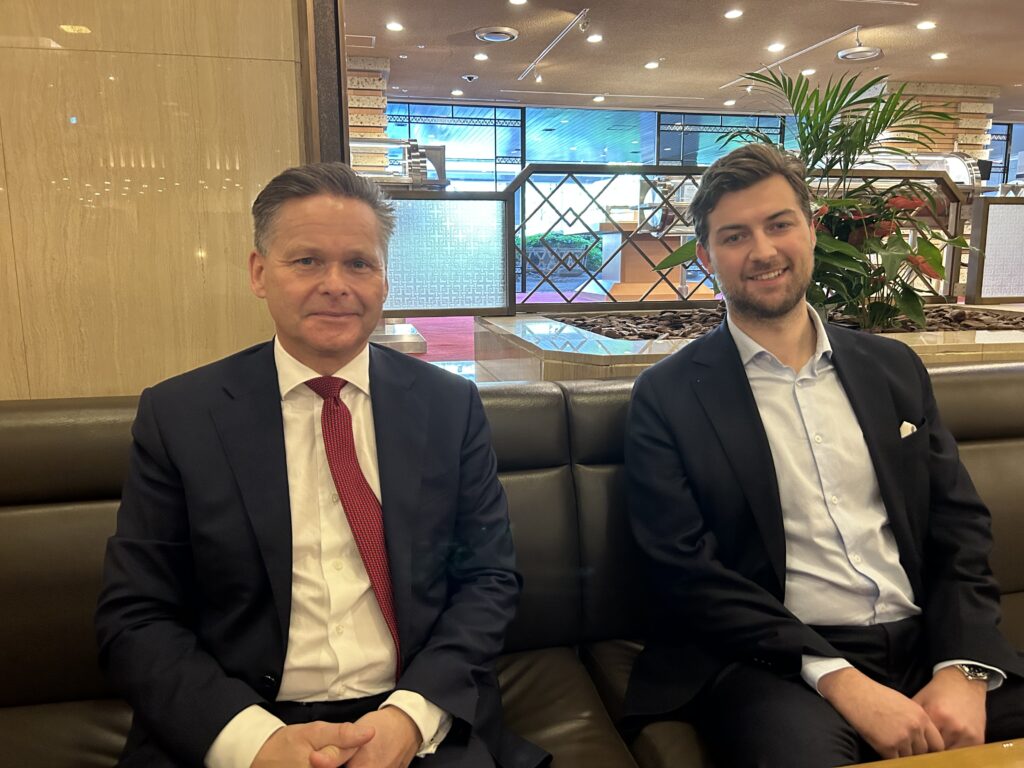
(Introduction)
The Norwegian shipping company Western Bulk (headquartered in Oslo) operates a fleet of 100-150 bulk carriers. The company does not own any vessels and covers all vessels with medium to short-term charters. They are a so-called asset-light player. CEO Mr. Hans Aasnæs, who visited Japan in early November, explains the advantages of the asset-light strategy. He says, “We are a global dry bulk operator that matches cargo and vessels in all market conditions. We charter vessels from different owners and move cargo for our customers around the world.”(Text by Hirofumi Yamamoto)
■The asset-light player
After the collapse of Lehman Brothers in September 2008, Japan’s three largest shipping companies, NYK Line, Mitsui O.S.K. Lines, and Kawasaki Kisen Kaisha, recognized the risks of long-term charters, and the three companies are trying to match cargo and vessel contract periods and keep charter periods as short as possible.
The bulk divisions of the shipping giants are moving towards asset-light shipping, like Western Bulk.
Aasnæs CEO points to “customer first” as an advantage of the asset-light approach.
“The dry bulk market is very volatile. Western Bulk uses an asset-light business model that combines advanced risk management, market data, and analytics to optimize fleet deployment and vessel/cargo matching. Our business model involves connecting cargo owners with vessels by actively participating in the market. We engage in making cargo contracts for spot business, forward business, and Contracts of Affreightment (COA). We strategically utilize both period ships and time charter trips (TCT) to execute our cargo program and take positions in the market. This approach allows us to capture value in dynamic market conditions while effectively managing associated risks.
Since 2016, Western Bulk has gained the trust of cargo owners and expanded the size of its fleet. Currently, the company’s fleet consists of approximately 70% Ultramaxes, 20% Handysize, and 10% Panamaxes.
Does Western Bulk charter mainly on a spot basis or do you also charter on a medium-term basis?
“The majority of our fleet consists of short-term chartered vessels. Some of our vessels are chartered for periods as long as five years. We decrease the risk of market fluctuations with vessels chartered for less than three years. One of the criteria for deciding on a medium-term charter is the quality of the vessel.” (Aasnæs CEO)
The former Western Bulk was split in 2016 into Bulk Invest, the ship-owning company, and the current Western Bulk, which has a chartering function. Bulk Invest, the ship-owning company, has been declared bankrupt by the Oslo High Court.
■Restarting Western Bulk
What is Aasnaes CEO’s view of the situation at that time?
Aasnæs CEO said: “Frankly speaking, in 2016, neither I nor most of the current Western Bulk employees around the world belonged to Western Bulk. Of course, we know we have this history, and we are not trying to hide from it.” ” I personally believe that building trust with our customers is the most important thing, and here in Japan we need to rebuild that trust. That is why we came to Japan and set up a pop-up branch in Japan for a limited period of four weeks. This is also because we want to have a close exchange of ideas with Japanese customers”.
Aasnæs CEO shared his views on building trust.
“Since 2016, we have spent the last seven years rebuilding trust. But that trust can fall apart in five minutes if we do something wrong. We always keep that in mind.”
The EU ETS will start in 2024.
How will Western Bulk react as an asset-light player when it comes to carbon emissions?
“As an operator, the most important thing we can do is to be clear that we are ready to co-operate with owners (and cargo charterers) to reduce emissions, whether this is running vessels on biofuel whenever possible, co-operating on speed settings and even operational profiles. We believe the way to go is performance-adjusted CPs, through which both the owner and the operator can be incentivized to do their part to reduce the emissions of a ship. For ships trading within the European Union, Western Bulk is set up to purchase emissions certificates (EUAs) and can do so on behalf of owners. “We have already done cargo contracts where the price of CO2 is included in the freight cost and bought our first emissions certificates to hedge our CO2 exposure”.
While building on its history, Western Bulk is also looking to develop relationships with Japanese shipowners as a new asset-light player.
“Our main focus is not just size, but whether we want to be a good long-term partner to our customers, whether they are shipowners or other cargo or commercial providers, and that is our goal,” he said.
Aasnæs CEO explained to me continuously.
“We believe it is whether we want to be a good long-term partner to our customers. And secondly, we want to be a company where qualified people want to work in this industry. Quality is important, of course, but to be a company that customers trust, you need the right people, the right business people, and the right customer-centric culture. So by having a flat structure and contracts with the right people. I hope to build such a company in the future so that we can regain the trust of the Japanese maritime industry.”
It’s been seven years since Bulk Invest went bankrupt in 2016. Can the new Western Bulk rebuild trust with the Japanese maritime industry?
It can be summed up in a single sentence that Aasnæs CEO points out: “It takes years to build trust, but five minutes is enough to break it.”